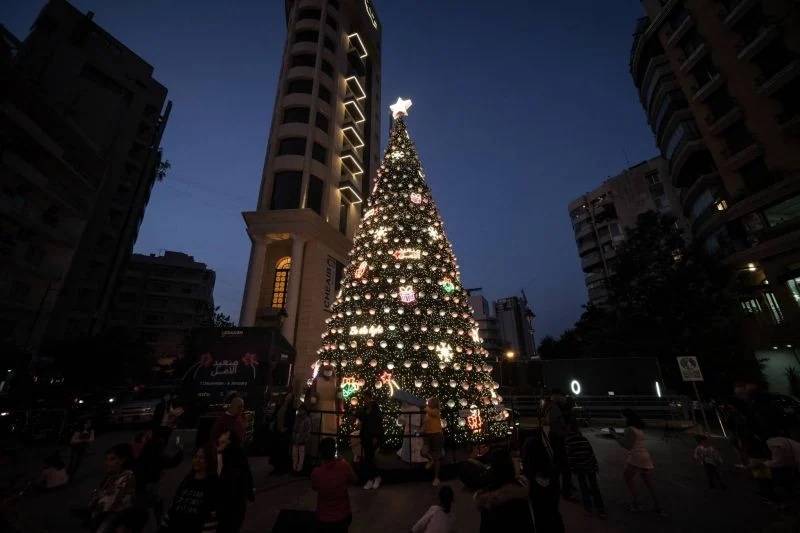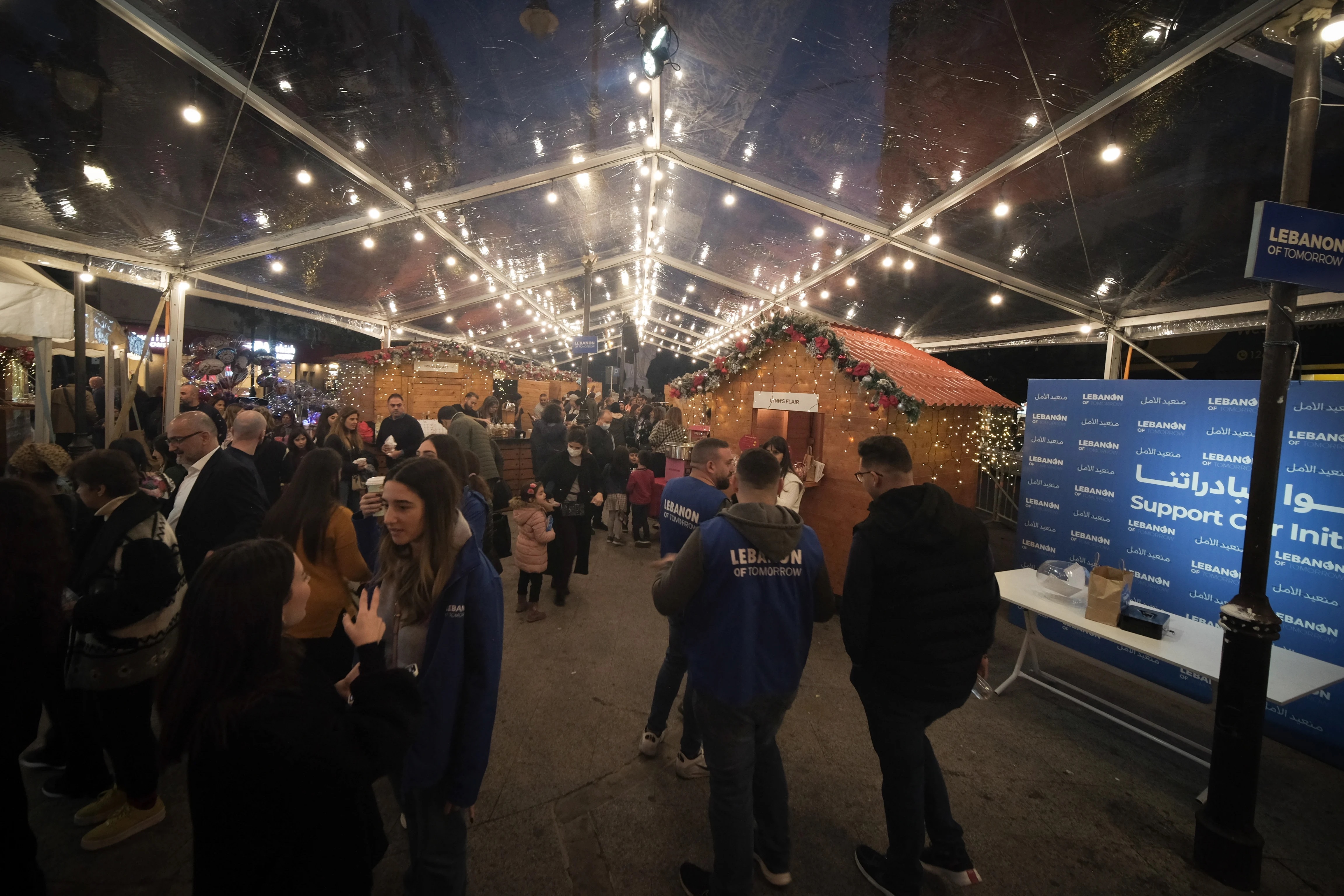
Christmas decorations in the streets of Beirut. (Credit: João Sousa/L'Orient Today)
Rima tours the Christmas markets to get her children, 10 and eight, into the holiday spirit. Sitting on the ground, Rima rests her legs as her daughter Kate runs around. “I’ve already written my list!” the little girl says with a big smile.
This Christmas resonates differently for most Lebanese families. While the country is in the midst of an unprecedented economic crisis, some parents are doing their best to communicate the holiday spirit to their children despite the fact that their lives have changed drastically over the past three years.
Rima’s family, who live in Zouk Mosbeh, is no exception.
While she used to take her children out for several activities a week, these days they get only one — and Rima and her husband make sure now to take their children on free outings.
“Our shopping is not the same anymore,” Rima, a stay-at-home mother, says. “Our daily life has been completely turned upside down.”
She adds, “Our children notice it when they see the price increase of the manouche (Lebanese flatbread topped with thyme) for example, we didn’t have to explain it to them.”
So, for this Christmas, despite the never-ending crisis, the family has opted for the “Secret Santa strategy.”
“It keeps the spirit of Christmas alive on a smaller budget,” says Rima, who used to give more than four gifts to each child.
“The crisis has taught us to be satisfied with the necessities,” she says. For Christmas dinner, which her children will spend with their grandparents, each guest will have to contribute a dish.
But regardless of the changes, next to Rima, Kate is excited about the holidays. “It's going to be fun,” she says.
Christmas is a ‘state of mind’
For Neemat, it is necessary “to move forward despite everything, especially after the coronavirus. It will allow us to start again.”
For this 50-year-old mother of three children aged 14, 19 and 21, Christmas is above all a “state of mind.”
“Before, Christmas was lavish,” she says. “This year, it looks like something else, we have adapted the celebration to our means.”
She adds, “We used to be a consumer society, now I prefer homemade and it allows me to save money.” Against all odds, Neemat has decided to stay in Lebanon.
“I decided to refuse, I refuse to stagnate,” she says.
 A Christmas market in Beirut. (Credit: João Sousa/L'Orient Today)
A Christmas market in Beirut. (Credit: João Sousa/L'Orient Today)
Helene* and Samer*, who work in public administration, put aside their desires to please their two daughters, aged four and seven.
Their combined salaries are no longer sufficient, which prompted Samer to find a side job to support his family.
“We sacrifice a lot so that our children don’t feel the crisis,” says Helene, who lives in the Bekaa Valley. This year, however, their ambitions were thwarted.
Instead of 10 gifts, their children will have two. Instead of three outfits, one.
“Christmas is my favorite holiday since I was a little girl, it’s a time to get together as a family and celebrate the birth of Jesus,” Helene says. “And then, I tell myself that it’s much worse for other families.”
The heart is not in it
For Justine, a school teacher, the economic crisis has taken a toll on her mental health. This year has been the worst for her.
While her family, who live in Fanar, can still afford to live decently compared to many Lebanese households, “the stress of everyday life and the tiredness impact our children,” she says.
“It is true that we now are paid a small amount of money in dollars, but the gap between the greenback and the Lebanese lira has never been so wide,” she adds.
Her husband, who is a mechanical engineer, saw his projects melt away at the end of the year.
“We count our pennies now and we think twice before buying,” says this mother of three children aged 14, 13 and nine.
 Christmas decorations in the streets of Beirut. (Credit: João Sousa/L'Orient Today)
Christmas decorations in the streets of Beirut. (Credit: João Sousa/L'Orient Today)
Justine, in her 40s, can’t seem to find the Christmas spirit. Usually, she has a clear idea of the Christmas menu two weeks before the party.
“This time around, I don’t know what to do. I really thought things were going to change, but we’re completely left out,” she says. “There aren’t even any Christmas decorations on the streets, and we’re still in the dark because of the power outages.”
Still, she plans to keep up appearances: the tree is up, she will have dinner with the family, and her children will have gifts that fit her budget. But her heart is not in it.
“I feel guilty for not being able to channel the joy of the holidays to my children,” she says.
‘Only a mother can understand this heartbreak’
For Rana, a housewife, the damage is not only moral, she can no longer afford to celebrate Christmas. Her four children are between the ages of nine and 14.
“I don't feel like it’s Christmas,” she says. “Even though it’s the most special day for us.”
Rana’s husband has been without a job since the crisis began. A friend gave her a tree and some decorations to put up in her living room. “I wanted them [the children] to feel the holiday spirit, but they know something is missing,” she says.
Rana is banking on the people who will be gathered in the church for Christmas. “The important thing is that we're all together,” she adds.
Caroline’s family is among the nearly 80 percent of Lebanese who have fallen below the poverty line.
Her husband, who earns a daily wage, has not found a steady job since late October 2019. The couple has four children between the ages of 14 and 20.
“We used to do everything to make our children happy,” she says, adding that she used to be able to afford to give gifts.
On the phone, she timidly answers questions, almost apologizing for being in such a state of destitution.
A few days ago, the 50-year-old barely had the courage to tell her children that they would not be getting any presents. “Only a mother can understand this heartbreak,” she says. Every time she visits the supermarket, she comes out with a heavy heart.
“I see these other carts full of products, but I can only put a few in mine,” she says with a broken voice.
For Christmas, she put away a few small bills so she can give LL100,000 to the younger ones. “I know it’s not worth anything anymore, but I do what I can.”
* Names have been changed.
This article was originally published in French in L'Orient-Le Jour. Translation by Sahar Ghoussoub.
